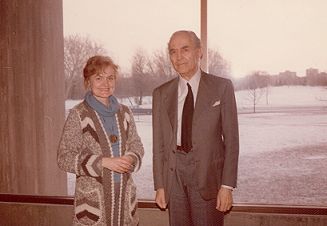 |
Essays - Introduzine: Guido Agosti
OPUS - Faculty of Music Student Journal
(Vol.15 No.5, p.7, 1980)

Maestro Guido Agosti at the University of Western Ontario
Now and then we are reminded of how truly ‘symphonic’ our
lives are, how certain themes, which seemed so full of promise,
vanish soon after the exposition, or become simply
accompaniment figures; how, instead, insignificant motifs
later take over an entire development, or generate
a whole new movement, while other themes reappear in unexpected
places….
In Italy, for a little piano pupil of my generation it
was common to dream (sometimes in an air-raid shelter) of
attending one day the Corso di Perfezionamento at
the Accademia di Santa Cecilia in Rome. The magnetic names
were Casella, Zecchi, Agosti. I never went to Rome. Instead—after
lots of water flew under the bridges of the Tiber—I
found myself in London, Ontario, persuading innocent Canadian
students to cross the ocean and to absorb some ancient wisdom
in the Tuscan landscape. More than a dozen of them attended
maestro Agosti’s summer courses at the Accademia Chigiana
in Siena. So, the Agosti theme in my life developed through
another generation.
In 1973 I served as the ‘Presidentessa’ of
the Ontario wing of Canadian Music Competitions. Among the
members of the international jury that year were M.me Jeanne-Marie
Darré (whom I used to listen to from the distant students’ seats
at the Salle Pleyel in Paris in the mid 1950s), and…Guido
Agosti. A luncheon and conversation with these dream figures
from my growing-up years, at the Courtyard Café in
Toronto, remain in my memory as having been molto vibrato indeed….
Students’ reactions and comments in the expectation
of the March 7 master classes here at UWO, prompt me to say
a few words. There are artists who refuse to give short-term
classes altogether, believing the ‘cosmetic job’ – which
alone is possible in the restricted time allotted - to be
useless; and, that the expectations of ‘instant refill’ which
such encounters create are dangerous and wasteful. Other
artists believe instead that the contact with an eminent
figure, however brief, can only be beneficial, creating as
it does a heightening, an alertness, which get lost in the
school routine of weekly lessons. As in everything, it is
not the experience, the event, which is important, as what
that experience is made to serve.
In most students’ preoccupations I read still the
North American obsession with having to be liked, with pleasing,
with impressing others; the need for reassurance, for praise,
for having one’s views and prejudices confirmed, agreed
upon; the desire to test oneself; the craving for approval.
Many years ago, in another OPUS article I described the reaction
of a fine Yugoslav violinist who, after being profusely praised
and reassured at an audition with a Master, packed up his
violin and never came back for lessons. The compliment, he
felt, only addressed his limits, not his potential. A true
compliment is ‘neither alms, nor a bribe’ but
the examination of greater possibilities in the music and
in oneself; it is to enter the dimension of action, not of
reaction: to be given a fresh opportunity to see and hear
more, better, to re-examine one’s assumptions and prejudices
through someone else’s views and even, possibly, prejudices.
But what about the terror of being put down in public?
Alas, that is the test of one’s fortitude and dedication,
of true equipment for a life in which put-downs by critics,
colleagues, agents, etc. is just part of the package. Legendary
cellist Pablo Casals, as a little boy, reprimanded the illustrious
professors who had first put him down for his youth, in front
of the class, before hearing him play, and later, of course
inviting him to study with him. Casals too, never went back.
But not many are as immune to intimidation as he was.
Human beings are inclined to show-off their ‘mud-pies,’ and
to delight in having them appreciated, in sharing the achievement.
It is good when someone helps with the water, lends us a
spade, tools, new moulds. Humans cry when their mud-pies
are stepped-on. But that is life… Sometimes it happens
by accident, or by ignorance, sometimes wilfully. We call
maturity the ability to distinguish and react accordingly.
Or, better, to act upon the event fruitfully, rather than,
by reacting, revealing only one’s needs, one’s
craving.
I’ve of ten told the story of Bartók who,
it is said, wanted very much to meet Debussy, but was told
he should not try, as Debussy could be very rude. But Bartók
persisted, and was told that Debussy had actually thrown
out a visitor. “Do you want to be kicked out by Debussy?” he
was asked. “Yes” Bartók replied. It is who does
the kicking that matters. Another legendary musician, violinist
and teacher Joseph Gingold of Indiana University, told me
how totally unimportant to him had been Toscanini’s
behaviour, his temper, his insults, when Gingold was concert
master of the NBC orchestra: just to learn from Toscanini,
to be in his presence, mattered.
It is hard for everyone, for innocent students in particular,
to learn that none can either give or take away self-esteem.
Yet, only the truly gifted seem to be able to act upon experience,
rather than going through their days reacting to other peoples’ reactions.
They move on, finding pleasure in their mud-pies.
The visit of an old Master who radiates his contact with
a larger musical world, both in the past, and in the present,
is a wonderful opportunity for students to test, yes, but
only their skill, and to enlarge upon it, to respond to someone’s
perception of the music as an alternate possibility, if not
as a revelation.
It is a chance to test one’s ability to distinguish… St.
Paul prayed for his friends to have “the gift of true
discrimination.” Ah, but isn’t that the business
of schools and teachers to achieve? Does our school make
it so? Do we? |